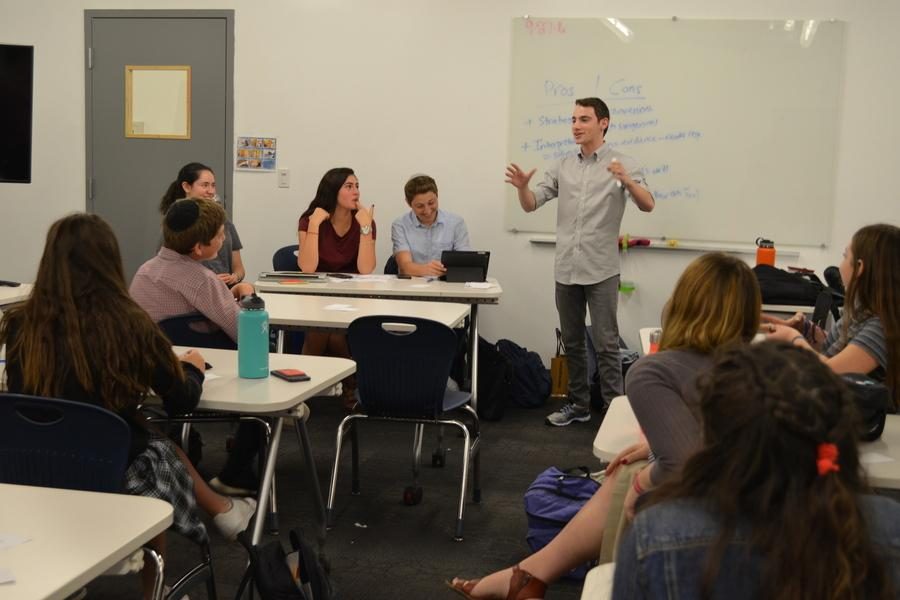Admin cancels ‘bubble’ on Model Congress team, saying uncertainty caused more problems than it solved
POPPED: Model Congress practice, pictured above, continues this year without bubble members.
October 5, 2016
School officials popped the tradition of a “bubble” on the Model Congress roster this year, ending a custom that let some students who hadn’t made the team attend practices in hopes of making the team later, or sooner if someone else dropped out.
In recent years, students vying for a coveted spot on the Penn or Princeton Model Congress teams could expect one of three outcomes after fall tryouts: acceptance, rejection or a spot on the bubble, meaning they showed potential and could attend team meetings to improve by watching members practice.
But this year, Model Congress adviser Mr. William Reusch, along with Principal Reb Noam Weissman and General Studies Principal Mr. Daniel Weslow, decided the system created too much uncertainty and was not the best use of the bubble-students’ time or talent.
“On a personal note, I didn’t like the mixed messaging of the bubble,” said Mr. Weslow. “There should be opportunities for students that are showing up to practice everyday to compete if they want to.”
In addition to attending team practice, students on the bubble could be added to the trip later if they improved significantly, and some were added at the last minute if another student dropped out before competition.
Mr. Reusch said it was uncomfortable for everyone.
“What happened was those kids who were on the bubble were like, ‘What’s my spot? What am I doing here?’” said Mr. Reusch in an interview.
On average, eight students made the bubble and four of them would make the trip that same semester, according to past years’ team captains Daniel Soroudi ’16 and Avishai Rabin ’15.
Students who were actually on the bubble agreed that it was awkward.
“It wasn’t terrible, but I think it was kind of a good idea that they got rid of the bubble,” said sophomore Ari Sassover.
“Last year it was really overwhelming for me because I wanted to do a bunch of extracurriculars,” Ari said. “The fact that they put me on the bubble, and I didn’t know whether … I was going to do the Model Congress trip was kind of annoying, so it’s understandable and it gets rid of all that questioning and confusion.”
Those not chosen for Model Congress are now being encouraged to try out to participate fully on one of the other teams.
That opportunity can come in the form of the Mock Trial team, he said, or the newly revived Model UN team, which has already been dubbed by some students as the unofficial “JV Model Congress.”
Of the 30 students who tried out for Model Congress this year, only 13 made it – an acceptance rate of 43 percent. Eleven more were automatically on the team because they had won awards on past trips.
For Model UN, 22 students tried out this year and 14 were accepted, about 64 percent.
The uncertainty of the bubble also caused other problems.
“The parents have to sit and wait for two months to figure out if they have to pay over $1,000,” said current Model Congress co-captain Maya Golan, “and if their kid does make the trip, they have to scramble to pay over $1,000, and if the kid doesn’t make the trip it’s annoying if they put aside over $1,000.”
But the bubble had its defenders as well.
“Kids get to be around the more experienced debaters, so they get to soak in what they should be doing and how they should be acting and speaking,” said junior Ilan Bouskila. “I wasn’t on the bubble freshman year, but just from being in practices with the seniors helped out a lot.”
Sophomore Clara Sandler went on the Model Congress trip to Princeton last year after having been on the bubble. She didn’t make the Model Congress team this year but is now heading up Model UN.
Even though students can hone their public speaking skills in Mock Trial, Model UN, or even Town Hall, Clara said there are particular skills taught in Model Congress.
“Model Congress really teaches you how to speak like a politician, which is different than speaking like a lawyer or a diplomat at UN,” Clara said.
To solve this problem, a group of 11th-graders on Model Congress have assembled a lunchtime mentoring program to coach students who did not make the team. During their inaugural meeting Sept. 22, six trainees split up in to three groups of two with juniors Ilan Bouskila, Rami Gruman and Sam Hirschhorn.
Rami said he was worried that without the bubble, there wouldn’t be enough students ready to join Model Congress when seniors graduate.
“It depends a lot on how many people you anticipate will drop out,” said Rami. Students drop out senior year for various reasons, he said, and it’s hard to predict.
“When you anticipate more people dropping out, I think that the old bubble system becomes necessary,” Rami said.
Meanwhile, this year’s Model Congress captains complained that they hadn’t been consulted.
“We were chosen to be team captains because, seemingly, we know the most about Model Congress and what’s best for the team, so for them to take away the bubble, which I think is critical to the development of new team members, and without consulting us, is somewhat disappointing,” said Alec Fields, who is co-captain of Model Congress this year with Maya Golan and Maayan Waldman.














